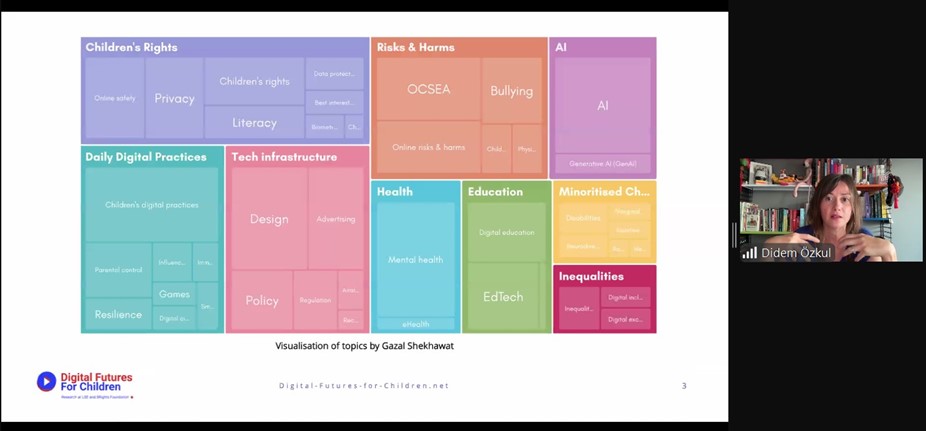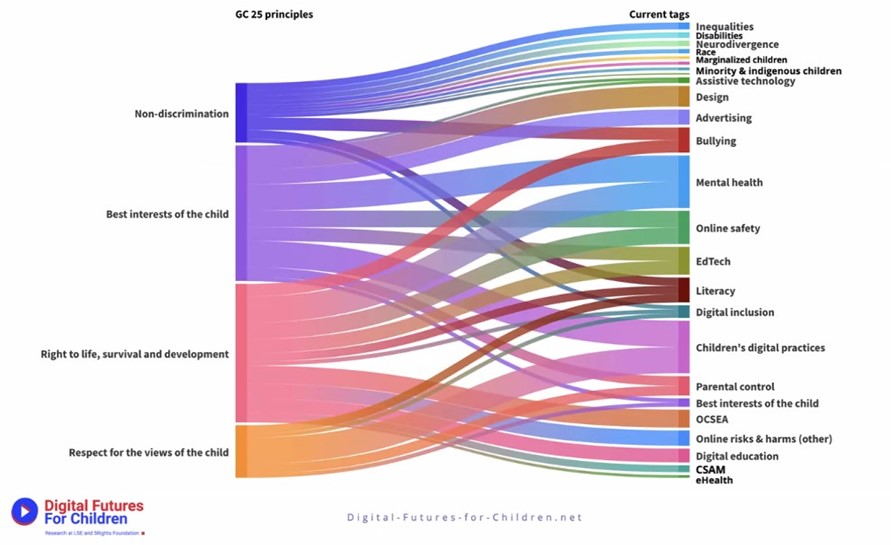Professor Sonia Livingstone welcomed participants to the meeting and briefly introduced the DFC and our work.
Two ongoing projects were then presented by Dr Kim R. Sylwander and Dr Didem Özkul, which were followed by discussions and contributions from participants. Below are summaries of the projects and key takeaways from the discussions.

Mapping the impact of General comment No. 25 (GC25)
Dr Kim R. Sylwander presented the DFC project on Mapping the Impact of General comment No. 25 and called for input by participants.
In 2021, the Committee on the Rights of the Child adopted General comment No. 25 which sought to clarify how States parties to the Convention on the Rights of the Child should implement its provisions with respect to the digital environment, providing guidance on relevant legislative, policy and other measures. Since the adoption of the General comment in 2021, there has been no systematic assessment of its take up or use around the world, nor of the benefits that this may bring to children’s rights in relation to the digital environment. General comment No. 25 encompasses a wide array of issues, actions and intended outcomes: we need to know if they are being realised, and where further encouragement or advocacy is most needed. This new DFC project asks: where, by whom, how and why is General comment No. 25 being used? Is General comment No. 25 proving useful and genuinely impactful (and if not, why not)?
Key takeaways from the discussion
Participants discussed the importance of General comment No. 25 and shared their experiences of working with it in their own national contexts. They also provided examples of how they were working with the General comment in their advocacy work and research.
Here are a few of the examples and issues they raised:
- Advocacy work in Ireland for the upcoming election year resulted in a position paper which points to the ways in which Ireland is failing to live up to General comment No. 25.
- Amnesty has conducted participatory research on children as human rights defenders in online campaigns in Kenya, the Philippines and Argentina. However, they noted the difficulties when fundraising for this type of collaborative research with children, as opposed to research where children are simply included as token voices in adult-led projects. They have found General comment No. 25 relevant when fundraising in that it is useful when entering adult spaces as it represents “on paper commitments” providing leverage for change as well as funding.
Participants from civil society and non-governmental organisations raised the issue that there is a strong awareness of General comment No. 25 within the child rights eco-system but not as much so “on the ground” within national contexts. Child rights advocates nonetheless identified the importance of the general comment when working within national contexts as it is “an important guiding document when implementing specific measures on a national level”. Participants further pointed out that human rights-based organisations, such as the EU, are more well suited to taking up General comment No. 25 as compared to other types of organisations as the language and approach of the General comment can more easily be integrated into ongoing processes.
“Whereas, for instance, national governments may not necessarily approach issues related to internet governance from a purely human rights-based perspective and therefore they may be less likely to take up the language of the general comment.”
The discussion provided a snapshot of the various levels on which work is being conducted— nationally, regionally and internationally — related to General comment No. 25 and gave insight into where difficulties may arise when advocating for the rights of children in the digital environment, but also when the general comment can be useful.
The DFC will continue its work on mapping the impact of General comment No. 25 and invite all our friends and collaborators to contribute in our upcoming consultations.
The final report will be launched in November 2024.
We invite you to contribute to the project here.
The DFC research database

Dr Didem Özkul presented the DFC research database which aims to contribute a robust global evidence base to underpin the collective understanding of children’s rights in the digital environment. The research database responds to an identified problem in accessing good quality, relevant evidence that comes from ethically grounded and peer-reviewed sources. To respond to this need our research database covers a range of topics relevant to General comment No. 25. The database provides summaries and key takeaways as well as notes on methodology for each resource, which are fairly recent sources—as technology and policies are evolving fast. We aim to help child rights advocates, researchers, and policymakers find this research and use it as evidence to advocate for children’s rights in the digital environment.
The covered topics include but are not limited to AI, Inequalities, Risks, Harms, Mental Health, Education, Parental Control, Resilience, Tech Infrastructure, Advertising, Media Literacy, Cyber-bullying, EdTech, Digital Divide, Minoritized children (e.g., disabilities, marginalized groups, neurodivergent children), online safety, OCSEA, CSAM. We are continuously adding resources to the database and invite our wider network to contribute to our work here.

The research database will be a public Zotero library and will be launched in October 2024.
Key takeaways from the discussion
The discussion highlighted the importance and usefulness of the research database in a number of child rights-related fields as well as national contexts. Suggestions were made on contexts where there is emerging evidence that may be of interest to include in the research database, such as China and Canada. Participants also discussed suggestions for possible features of the database such as offering users basic instructions on how to search for research, considering that many who use research evidence in governmental work or civil society organisations may not be familiar with searching for academic literature.
The importance of accessing evidence from other national contexts was raised by participants from the USA who remarked that there is a tendency to only look at national evidence both in research and policy. The discussion also highlighted the need for a research hub on which others may build new evidence, as participants remarked that it is important to “not reinvent the wheel with every research project”.
The DFC research database provides a rigorous vetting process for the research included, it will contribute a secure source of evidence for those working with issues related to the remit of General comment No. 25.
Resources and current issues raised by participants
During the discussion participants raised current developments related to children’s rights in the digital environment:
- USA: In July of 2024, the US Senate passed the Kids Online Safety and Privacy Act which includes similar provisions to the earlier Kids Online Safety Act and the Children and Teens’ Online Privacy Act.
- Canada: The Government of Canada is currently undertaking work on privacy and age assurance, the Office of the Privacy Commissioner has launched an exploratory consultation for this purpose to which anyone can contribute.
Resources and research projects
Text authors: Kim R. Sylwander and Saumyadeep Mandal
Image credit: Didem Özkul and Gazal Shekhawat